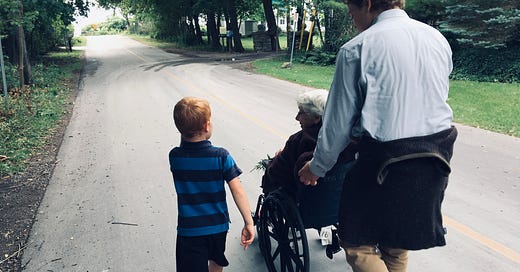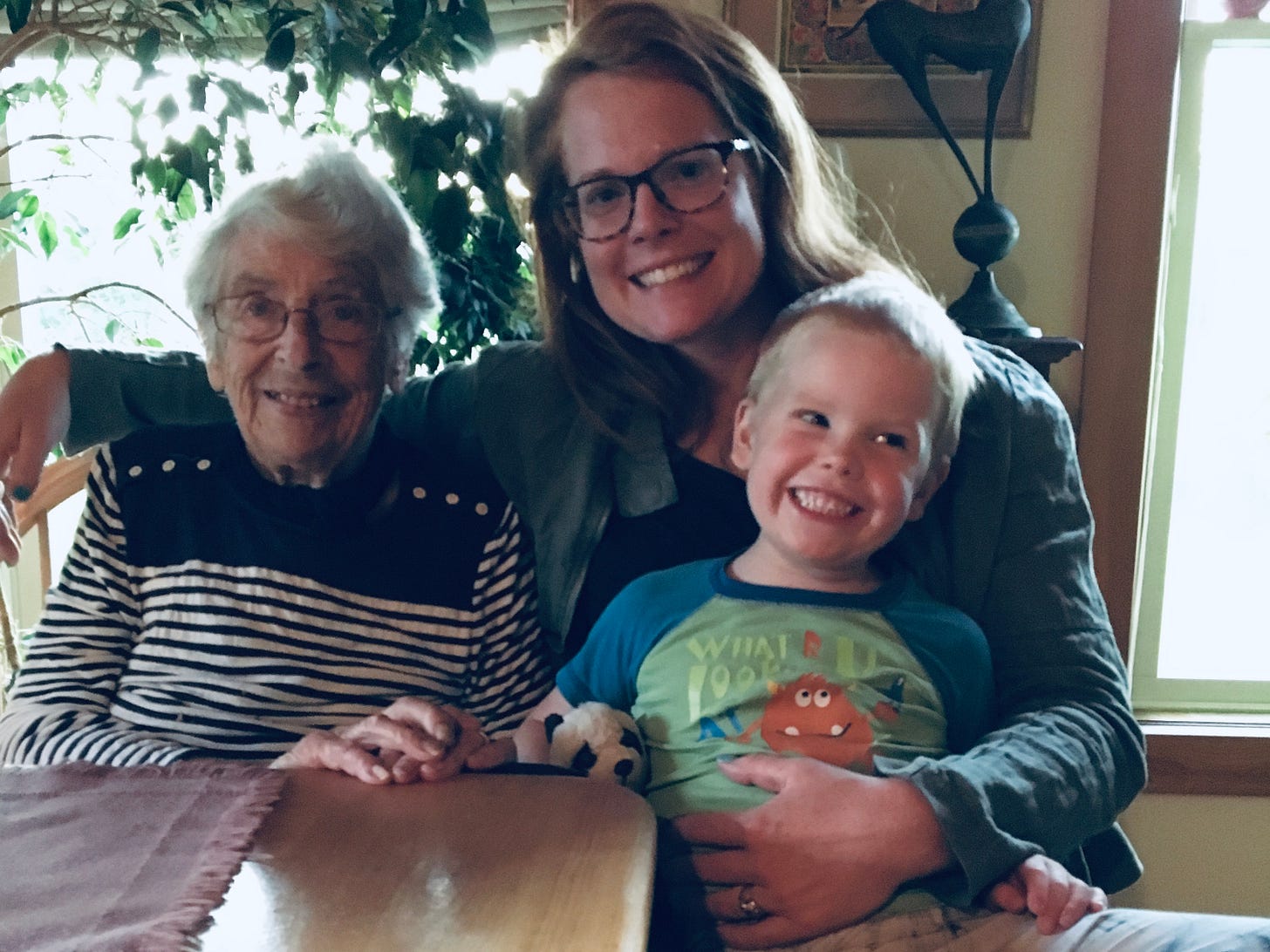Earlier this week, I made peach-plum platz for dessert. Platz is a traditional Mennonite dessert that my grandma used to make. Seasonal fruit gets mounded on top of a biscuit-like base and covered in a sugary topping, then baked to make a sort of open-faced pie. In my memory, Grandma’s platz was much tastier than mine, though my children assured me that mine was quite delicious. Unfortunately, they cannot compare the two.
I miss my grandma more at this time of year than at any other. We just passed what would have been her 96th birthday, and the fourth anniversary of her death is coming up next week. It’s impossible to live through a September without thinking about her.
My grandma, Mildred Nigh, was an impressive woman—the youngest of seven kids who grew up on a poverty-stricken farm during the Great Depression, and the only one of her siblings to get a university education. She worked as an occupational therapist and went on to travel the world and live in many different places, from Lithuania and Lebanon, to Greece and the Dominican Republic. She hiked the Great Wall of China, volunteered in Ecuador, and visited the Taj Mahal, with me in tow. I caught her travel bug, for sure.
So, when I think about Grandma, I think about travel. But I also think about food—because most of the time I spent with her was in her rustic farmhouse kitchen, near Lake Erie in Port Colborne, Ontario. She’d putter around, peeling peaches and tipping green beans and setting rolls for dinner, while I sat at the table, listening to her tell stories and answering her many questions about my life. She often left the classical music station playing on the radio while she worked—and even when she wasn’t in the room. It was the soundtrack to her home.
Grandma generously salted her cantaloupe, which never failed to spark controversy around the table. She also loved Limburger cheese. Every Christmas she asked for it in her stocking and got it—much to the horror of her seven granddaughters, who could not comprehend how she could eat something so stinky. One day, she told us a story about a guy putting Limburger cheese in the forced air duct of her U of T residence in the 1940s and filling the building with an awful stench, and we laughed hysterically and agreed that, yes, this was a cheese preference worth preserving.
Grandma’s homemade food was the product of her time and, in some ways now, it seems outdated. But it was so delicious and nourishing, so frugal and efficient, that I couldn’t help but absorb her lessons, even if it was indirectly or subconsciously at the time. I now find myself applying her lessons to my own cooking techniques the older and more confident I get in the kitchen.
What have I learned from Grandma? I mulled this over while making platz last night.
Lesson #1: Why buy it if you can make it from scratch?
Open her cupboard and you wouldn’t find much in the way of prepared foods. Grandma made everything from scratch—from pudding to bread to pastry to yogurt to jam and more. That must have been her Depression-era childhood coming out in her, this refusal to pay extra for something that could be “whipped up” at home. My mother does the same thing and, to this day, I sometimes have to remind myself that certain things can be purchased if I don’t have the time or desire to make them!
Lesson #2: Everything has a substitution—and it’s already in your fridge.
Don’t have a green pepper? Use a zucchini. Missing butter? Use vegetable oil. Need beef? Just use chicken. No coconut? Chop up some walnuts. These are not your typical go-to substitutions, but watching Grandma cook taught me that recipes are far more flexible and forgiving than we realize. It’s no big deal to put your own spin on things, especially if it spares a trip to the store or saves some money or puts a random ingredient to use.
Lesson #3: Let there be soup. Always.
I used to think my family just loved soup. Now I realize soup that is a repository for all the little bits of pieces of food that a frugal, waste-averse family needs to use up. Yes, it’s still delicious, but it is highly strategic. Grandma always made soup. So does my mom. So do I. (My husband laments that he never ate so much soup before he met me. But that’s what you get when you marry into this family.)
Lesson #4: Preserve everything.
Maybe another reason I think about Grandma in September is because it’s preserving season. This was the time of year when she “put up” peaches and tomatoes for winter in vast quantities. And oh, how we devoured those delicious, silky-soft peach halves with enthusiasm, slurping up the sweet syrup and sneaking spoonfuls of it from the jar—our dessert after our lunch (of soup).
There was a cold cellar off her kitchen lined with jars of preserves, and sometimes I liked to poke my head in to admire the colours. It gave me a cozy feeling, one of reassurance. I used to think, if the apocalypse hits right now, I’ll have unlimited peaches to subsist on.
Lesson #5: Never turn on the oven for just one thing.
That’s a waste of gas or electricity! There always had to be multiple things in the oven to make use of the heat, so if she popped one thing in, she’d quickly whip up tea biscuits or banana bread or a whole squash (to be turned into soup) to make use of the heat. This also meant that it wasn’t uncommon to open the oven a day or two later and find a sad, lonely, shriveled-looking squash in a dish, waiting to be remembered.
Lesson #6: Don’t skip dessert.
Grandma guaranteed dessert. She had a sweet tooth, which later caught up to her with a diabetes diagnosis, but she prioritized a great dessert as much as a nourishing main—and what kid doesn’t love that? Her specialty was pie, any kind of pie, starring whatever fruit was in season, heaped into her fluffy, flaky homemade pastry. I remember her telling me it was the easiest thing in the world to make; meanwhile, I still think of homemade pie as a real commitment. Big family dinners always featured two kinds of pie, and I always asked for half a slice of each. Grandma obliged me, and I appreciated that.
Lesson #7: It’s good to have a specialty.
Grandma was famous for her pie, but even more famous for her dinner rolls. She stuffed two pieces of dough into a muffin tin (I think) to make a little double roll that felt fun to pull apart as a kid. Those rolls were crispy and golden on the outside, white and fluffy on the inside, and my parents told me not to fill up on them, or else I wouldn’t have room for other food. (I always had room for other food.)
I’d give a lot to be able to sit down at her table again—to eat her soup and peaches and pie and dinner rolls. Life is funny. When I was younger, it felt like those days would last forever, but suddenly they end, and you realize just how special they were.
You Might Also Like:
Food Notes, Week 19.23
How to Make Cooking More Efficient
Meet Raven, Purveyor of Warmth






I love the tip about always having more than one thing going in the oven. I just tossed in some homemade bread crumbs as my brownies are finishing up. I will try to not forget them, like your grandma's squash!
Katherine: I just read and loved this piece. One of my grandmothers was Church of the Brethren (an Anabaptist church similar to Mennonites) and this reminded me of her. Thank you!